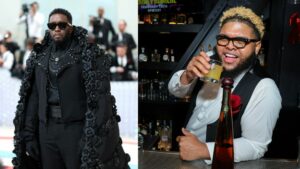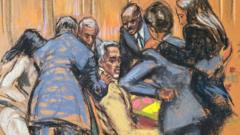Former associates of Sean "Diddy" Combs recount a troubling culture at Bad Boy Records during the 1990s, highlighting incidents of inappropriate conduct, alleged threats, and sexual exploitation as he faces serious legal challenges today.
Shadows of a Music Empire: Inside Diddy's Dark 90s Culture

Shadows of a Music Empire: Inside Diddy's Dark 90s Culture
Unveiling troubling behavior at Bad Boy Records, insiders reveal the stark realities of Sean Combs' reign amid ongoing lawsuits and criminal charges.
"I have so much money now that I could hire someone to kill you, and nobody would know. No-one would miss you. No-one would know anything." These chilling words, attributed to Sean "Diddy" Combs by former executive Daniel Evans, reflect a disturbing undercurrent of power and intimidation that characterized Combs' tenure at Bad Boy Records in the 1990s. As Combs, then known as Puff Daddy, accumulated vast wealth and recognition, troubling accounts from a recently released BBC investigation illustrate the darker side of his music empire.
In the 1997 anecdote that has resurfaced, Evans recounted the toxic environment within the label that experienced astronomical success thanks to artists like The Notorious B.I.G. As Combs' status skyrocketed amidst accolades, so too did claims of misconduct. Now, as he prepares for anticipated legal battles, the veil has been lifted, showing haunting memories from former staffers of a company embroiled in sexual allegations and assault lawsuits.
Conversations with over 20 ex-employees paint a worrying portrait of a culture rife with allegations of sexual exploitation—claims of women flown in for encounters at the studio and disturbing incidents where Combs engaged in sexual acts in plain sight of staff were met with ambiguous responses. "There was a course of conduct that became more egregious over time," noted Tony Buzbee, a US lawyer representing alleged victims of Combs, including one who alleges Combs raped her at a party in 1995 and subsequently threatened her. Combs vehemently denies these allegations, with his legal team labeling the claims as fabricated.
Several former employees recall instances of inappropriate behavior, stating that a party atmosphere mixed with unchecked power bred a toxic workplace where sexual misconduct was often overlooked. Evans reflected on a moment in 1995 when he unwittingly walked in on Combs having sex in the studio, an encounter that, in hindsight, raises ethical concerns about the environment encouraged by their boss.
Felicia Newsome, the studio manager from 1994 to 2000, echoed the sentiment surrounding the normalization of inappropriate conduct within the industry at that time, reflecting on how moments of hesitation or confrontation with Combs didn't always yield positive outcomes. Other staff reported instances of requesting women to be flown in for privileged encounters, submerging their professional environment in a culture of exploitation.
As more allegations surface, including accusations from former partners, the music mogul's once sparkly image dimmed significantly. Even though insiders grapple with reconciling their memories with claims that paint a different picture, the disturbing narratives are causing many to question the real Sean Combs behind the glitzy persona.
With a legal reckoning looming—Combs faces a plethora of lawsuits including sex trafficking and assault—what remains evident is a sprawl of conflicting narratives that may each hold elements of truth. As 1990s decadence collides with 21st-century reckoning, the legacy of Sean Combs, now an intricate web of fame and allegations, may finally face the scrutiny it has evaded for decades.



















